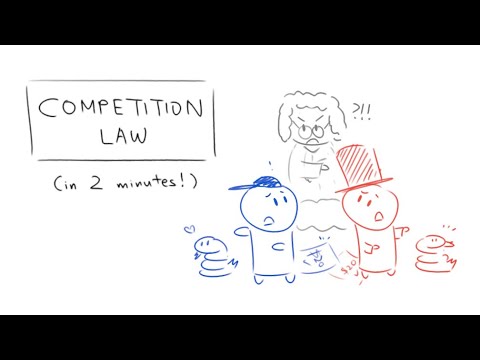
Welcome to this informative article on understanding Italy’s Anti-Competition Law. It is essential to note that while we aim to provide a comprehensive overview, it is always prudent to cross-reference with other reliable sources or consult legal advisors for specific guidance. Now, let’s delve into the captivating world of Italy’s Anti-Competition Law!
Understanding Italy’s Anti-Competition Law: A Comprehensive Overview
Understanding Italy’s Anti-Competition Law: A Comprehensive Overview
Italy’s Anti-Competition Law, also known as the “Legge Antitrust” in Italian, is a crucial legal framework that aims to promote fair competition and protect consumers in the Italian market. It is essential for businesses, both domestic and international, to have a clear understanding of this law to ensure compliance and avoid potential legal troubles. In this comprehensive overview, we will delve into the key aspects of Italy’s Anti-Competition Law, providing you with the knowledge necessary to navigate this complex legal landscape.
📋 Content in this article
1. The Purpose of Italy’s Anti-Competition Law:
Italy’s Anti-Competition Law is designed to prevent anti-competitive practices and promote fair competition within the Italian market. Its primary objective is to protect consumers from unfair business practices that may lead to higher prices, limited choices, and reduced innovation. By encouraging competition, this law aims to foster economic growth and ensure a level playing field for all market participants.
2. The Prohibited Practices:
Italy’s Anti-Competition Law prohibits a range of anti-competitive behaviors that can harm competition and consumers. Some of the key practices prohibited under this law include:
Understanding Antitrust Laws in Italy: Ensuring Fair Competition
Understanding Italy’s Anti-Competition Law: A Comprehensive Overview
In Italy, the concept of fair competition is safeguarded by the country’s anti-competition laws. These laws, also known as antitrust laws, aim to prevent and address practices that may hinder competition in the market. It is crucial for businesses and individuals operating in Italy to have a comprehensive understanding of these laws to ensure compliance and avoid legal repercussions.
Key Elements of Italy’s Anti-Competition Law:
1. Prohibition of Anti-Competitive Agreements:
Italy’s anti-competition law prohibits agreements between companies that have the object or effect of restricting competition. Examples of such agreements include price-fixing agreements, bid-rigging, market allocation, and collusion. It is important to note that under Italian law, even informal agreements or understandings between companies may be considered anti-competitive and illegal.
2. Abuse of Dominant Position:
Italy’s anti-competition law also addresses the abuse of dominant market positions. A dominant position refers to a situation where a company holds a significant market share or has substantial control over the market. It is illegal for a dominant company to abuse its position by engaging in practices that harm competition, such as excessively high prices, predatory pricing, and unfair contract terms.
3. Merger Control:
Italy’s antitrust laws require companies to notify and seek approval from the Italian Competition Authority (ICA) before merging with or acquiring other companies, if certain thresholds are met. The ICA evaluates mergers and acquisitions to ensure that they do not result in a substantial lessening of competition in the market.
Enforcement and Penalties:
Italy’s anti-competition laws are enforced by the ICA, which has the authority to investigate, prosecute, and impose fines on companies found in violation of these laws. The ICA has broad investigative powers and can request information, conduct inspections, and impose fines up to 10% of a company’s worldwide turnover for serious violations.
Title: Understanding Italy’s Anti-Competition Law: A Comprehensive Overview
Introduction:
Italy’s anti-competition law plays a crucial role in promoting fair business practices and ensuring market competition. As legal professionals, it is of utmost importance to stay current on this topic to navigate the complexities of the law effectively. This reflection provides a comprehensive overview of Italy’s anti-competition law, highlighting key aspects and underscoring the necessity of verifying and cross-referencing the information presented.
I. Legal Framework:
Italy’s anti-competition law is primarily governed by Law No. 287 of October 10, 1990, known as the “Italian Competition Law” (Legge Italiana sulla Concorrenza). This legislation aims to prevent anti-competitive practices, protect consumers, and foster a level playing field for businesses.
II. Prohibition of Anti-Competitive Agreements:
Under Italy’s anti-competition law, Article 2 prohibits agreements, decisions, or concerted practices that have the object or effect of distorting competition within the Italian market. Such agreements can include collusion to fix prices, allocate markets, or restrict production. It is essential to note that any agreement that falls within this scope is considered void and may attract severe penalties.
III. Abuse of Dominant Position:
Article 3 of the Italian Competition Law addresses abuse of dominant position. It prohibits businesses with substantial market power from engaging in practices that hinder competition or harm consumers. Examples of abusive behavior include predatory pricing, refusal to supply, tying and bundling, and discriminatory practices.
IV. Merger Control:
Italy has a robust merger control regime to ensure that mergers and acquisitions do not result in a significant lessening of competition in the market. The Italian Competition Authority (Autorità Garante della Concorrenza e del Mercato, AGCM) is responsible for reviewing and approving mergers that meet certain thresholds. Failure to notify a merger may result in fines and the potential unwinding of the transaction.
V.
